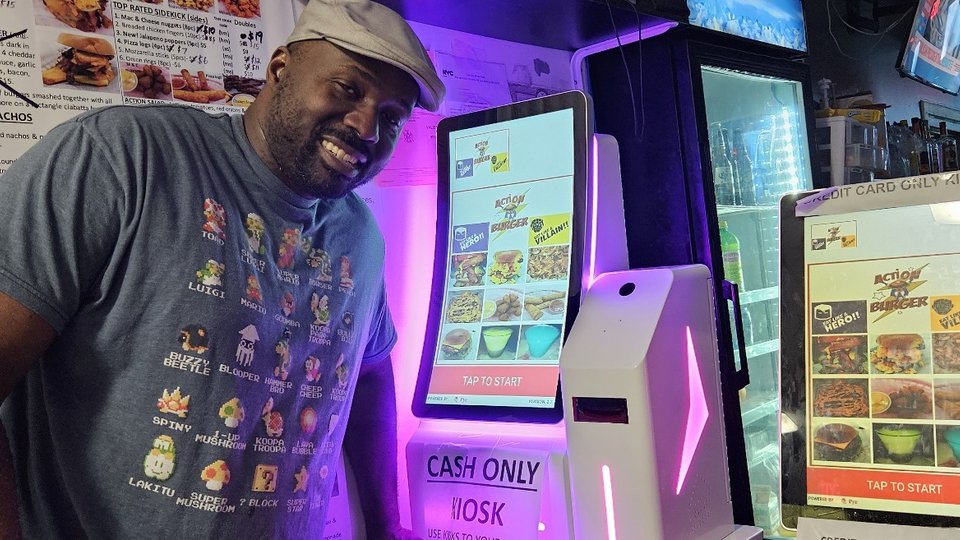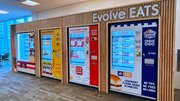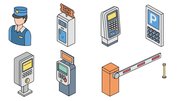Restaurants
Self-order kiosks keep Brooklyn 'video game restaurant' in the black
Self-order kiosks have helped allow Action Burger to expand as video game restaurant. Customers pay with credit or cash at three self-serve kiosks.

February 28, 2024 by Elliot Maras — Editor, Kiosk Marketplace & Vending Times
Vlane Carter has been a science fiction fan for as long as he can remember.
His love for technology led the Bronx, New York, native to a career in IT.
But it wasn't until he lost his IT job in 2009 that he was able to combine his love for science fiction into a second business career as the owner/operator of a "video game restaurant" in Brooklyn, New York.
The journey from hospital IT network supervisor to restaurateur was long and challenging, but Carter's persistence and his love for technology have paid off.
Once he lost his IT job, Carter decided he wanted to be his own boss. His love for science fiction spawned the idea of a restaurant that offers science fiction themed video games customers can play while waiting for their food.
In 2012, using his house as collateral for a loan to start the business, he launched Action Burger in an 800-square-foot retail space including the kitchen, with six to eight tables. His first video games were Street Fighter 2, Mortal Kombat 2 and UltraCade.
Working with a partner at the time, "I learned the restaurant business in like six months," Carter said.
He created a menu using character names from science fiction stories.
Challenges emerge
After one year, his partner exited the business and Carter was facing the possibility of having to close up shop.
"I was trying to do a lot to save the business," he said, including soliciting door to door for customers.
Assisted by his wife, Marian, who oversaw the kitchen, Carter managed to keep the doors open.
His marketing efforts included pitches to appear on the TV show Shark Tank in 2015 and 2016. Both years, he made it to the second round to get on the show. While he did not gain the chance to pitch his concept to the judges, the positive feedback encouraged him to pursue his vision.
In 2017, he doubled the size of Action Burger to 1,600 square feet with a video game at each table.
The extra space allowed him to serve more guests, but more business required more labor. This not only added to cost, but more supervisory tasks and more legal liabilities.
It seemed that every step forward included a step backward.
Kiosks offer opportunity
In 2019, he came across self-order kiosks at the International Restaurant Expo in New York City. He immediately saw the kiosks as a way to serve customers without having to hire more employees.
Carter started with one Tray kiosk that allowed customers to pay with credit cards. Working the POS terminal himself, he directed all credit card customers to the kiosk.
While the kiosk allowed him to take orders without an employee, customer acceptance was not immediate.
"The hardest part with the kiosk was to train the customer because a lot of customers really don't like using it," he said, looking back at his initial foray into self service.
"The loss in business balances off the (reduced) labor," he said, referring to business lost due to customers who did not want to use kiosks.
He was nonetheless able to make a profit and the business grew.
 |
Vlane Carter has found that self service kiosks go well with video games. Photo: Action Burger. |
COVID strikes
Then, in 2020, COVID hit. To stay profitable, he had to eliminate staff — which at the time included five or six employees, depending on the season — and outsource his food deliveries to third party delivery companies.
Keeping an eye on technology, Carter came across a Pye Éclair kiosk on the Internet that accepted cash in addition to credit cards. This intrigued him, seeing that a quarter of his customers were paying with cash.
"I wanted something that was going to replace the cashier completely," he said. "I didn't know (restaurant kiosks that accept cash) existed. I found one on the Internet by luck."
In 2021, he ordered an Éclair kiosk, which cost him $3,500.
His kiosks, which now include one for cash and two for credit cards, have allowed the business to grow without adding employees, Carter said.
The customers who don't pay in cash do not use the kiosk that accepts it, even though that kiosk is capable of accepting credit cards. Instead, he directs non-cash paying customers to the two kiosks that only accept credit cards.
"When (customers) see 'cash kiosk,' they think 'cash only,'" he said. "They're used to seeing signs in other stores, 'cash only.'"
The cash kiosk also makes change, but Carter keeps his prices in whole dollar amounts so the machine doesn't have to give loose change.
Sometimes the machine has a glitch and the order does not go through. This is why it's important to offer customers paper receipts, he said.
He also takes online orders. The third-party delivery services pick the orders up in the bar for delivery, which account for 20% to 40% of all sales, with winter being busier.
Long term, Carter hopes to franchise his video game restaurant concept.
Meanwhile, he continues to try to win a chance to appear on Shark Tank.
About Elliot Maras
Elliot Maras is the editor of Kiosk Marketplace and Vending Times. He brings three decades covering unattended retail and commercial foodservice.
 ChatGPT
ChatGPT Grok
Grok Perplexity
Perplexity Claude
Claude









